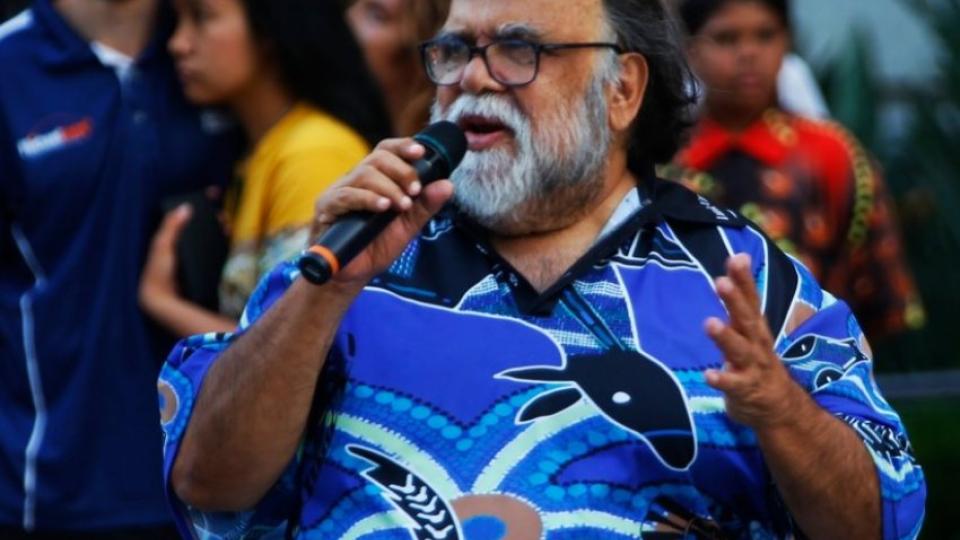Sam Watson 1952-2019: A giant of the Aboriginal rights struggle

Sam Watson, a giant of the Aboriginal rights struggle, died on November 27, aged 67. A prominent author, playwright and filmmaker, Watson was also the Socialist Alliance’s (SA) Aboriginal and Torres Strait Islander affairs spokesperson for many years.
As a leading Murri activist based in Brisbane, Watson was a veteran of Indigenous rights struggles going back to the 1960s. A proud Wangerriburra and Birri Gubba man, he a former academic at the University of Queensland, and received honours for his 1990 novel The Kadaitcha Sung and acclaim for his 1995 film Black Man Down.
Sam’s daughter Nicole Watson said he would be deeply missed, but that his legacy will continue into the future.
"Each year, Sam would be at the forefront of the Invasion Day rally in Brisbane," she told the ABC on November 27.
"It is his family's hope that the Invasion Day rallies will continue to grow each year, because we know that he will be there in spirit."
Sam became active at the age of 16, handing out how-to-vote cards for the “Yes” campaign in the 1967 referendum on constitutional recognition of Aboriginal people.
Nicole said her father was proud of his Indigenous heritage, which led to his life-long activism.
He was a founding member of the Brisbane chapter of the Australian Black Panthers. "He proudly belonged to the original Aboriginal Tent Embassy" in Canberra from its establishment in 1972, she added.
Throughout the 1970s, Sam worked with elders to establish Aboriginal community organisations and peak bodies in health, housing, education, employment and legal aid. He was an important figure in the Brisbane Aboriginal Legal Service in the 1990s.
Sam was also a long-time socialist. He always saw the necessity to unite the struggles of Indigenous people with the movements of working people and the oppressed.
Watson contested a number of elections, at state and federal levels, for SA. Running in the March 2009 Queensland state election, Watson told Green Left Weekly: "Socialist Alliance won't tolerate pressure on the most vulnerable in our community — we stand for supporting people instead.
“We won't support big business's rush to profit at our expense.
“We stand up for the rights of working people, the unemployed, students — they are the backbone of our community, yet their rights are being compromised.
“And we will be encouraging people not to feel like victims, but to consider themselves strong, powerful people, and on election day, they will be powerful.”
Watson stressed that SA was not just after votes, but is an activist, campaigning party: "Even after election day, we are a people-based party, and we will continue to connect with people, unlike the corporate parties."
Regarding the current status of the Aboriginal land rights struggle, Sam told GLW in January last year: "Aboriginal people are deeply concerned about the role of multinational corporations, which are seizing our land and water and destroying it.
“In Western Australia, we face uranium mining; in the Northern Territory, a nuclear waste dump; and in Queensland, they want to turn our state into one big coal mine.
“The fight for Aboriginal land rights is still critical for us. Our people will fight to defend our homelands from mining and other threats.”
On the current challenges facing the Aboriginal movement, Sam said: "The Aboriginal rights movement is at a crossroads right now. From the 1990s to the present, we experienced a process of transition from the streets to the boardrooms.
"But the young people are becoming impatient again. Devolution of the Black political movement is going on. Aboriginal people are moving back into the streets to confront white power once more...
“Aboriginal people face major problems right now, and we are demanding strong action — immediately.”
I was a friend of Sam, and worked closely with him over many years in Brisbane. I always admired and loved him for his tireless work for the Aboriginal community, working people and the poor.
He had a vision of a future socialist society in which Black and white communities would live together in harmony and cooperation, and where full sovereignty of Indigenous people would be recognised.
He and his life-long partner Cathy were always present at progressive events in Brisbane and a source of warmth and support for all those struggling for a better world.
Sam will be sorely missed by his beloved family, his friends and comrades, and the Aboriginal community in Queensland and nationally. His steady and patient leadership and wise counsel will be an important legacy for the Indigenous movement and progressive causes more generally.
History will show that Uncle Sam was indeed a giant of the Australian Aboriginal struggle and of the broader fight for a just, cooperative society free of racial oppression.